Kenneth Atchity's Blog, page 211
May 13, 2013
Sci-Fi's Underground Hit
Authors are snubbing publishers and insisting on keeping e-book rights. How one novelist made more than $1 million before his book hit stores.
Simon and Schuster has put down six figures for print rights to a
post-apocalyptic thriller called "Wool" that it believes could draw the
same readers that made "The Hunger Games" trilogy a success. WSJ's
Alexandra Alter reports on Lunch Break. Getty Images.
Hugh Howey's postapocalyptic thriller "Wool" has sold more than half a million copies and generated more than 5,260 Amazon reviews. Mr. Howey has raked in more than a million dollars in royalties and sold the film rights to "Alien" producer Ridley Scott.
And Simon & Schuster hasn't even released the book yet.
In a highly unusual deal, Simon & Schuster acquired print publication rights to "Wool" while allowing Mr. Howey to keep the e-book rights himself. Mr. Howey self-published "Wool" as a serial novel in 2011, and took a rare stand by refusing to sell the digital rights. Last year, he turned down multiple seven-figure offers from publishers before reaching a mid-six-figure, print-only deal with Simon & Schuster.
Simon and Schuster has put down six figures for print rights to a
post-apocalyptic thriller called "Wool" that it believes could draw the
same readers that made "The Hunger Games" trilogy a success. WSJ's
Alexandra Alter reports on Lunch Break. Getty Images.
Hugh Howey's postapocalyptic thriller "Wool" has sold more than half a million copies and generated more than 5,260 Amazon reviews. Mr. Howey has raked in more than a million dollars in royalties and sold the film rights to "Alien" producer Ridley Scott.
And Simon & Schuster hasn't even released the book yet.
In a highly unusual deal, Simon & Schuster acquired print publication rights to "Wool" while allowing Mr. Howey to keep the e-book rights himself. Mr. Howey self-published "Wool" as a serial novel in 2011, and took a rare stand by refusing to sell the digital rights. Last year, he turned down multiple seven-figure offers from publishers before reaching a mid-six-figure, print-only deal with Simon & Schuster.

Published on May 13, 2013 00:00
May 10, 2013
Story Merchant Clients Lisa Cerasoli and Dennis Walsh Talk Books on Peter Anthony Holder's Podcast


Listen to Podcast
 Writer and filmmaker, Lisa Cerasoli, is the author of As Nora Jo Fades
Writer and filmmaker, Lisa Cerasoli, is the author of As Nora Jo Fades Away, a non fiction account of caring full time for her grandmother who
suffered from Alzheimers.

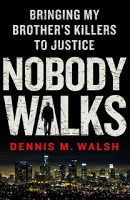
Dennis Walsh is a criminal defence attorney and the author of Nobody Walks: Bringing My Brother's Killers To Justice , the true story of how he avenged the murder of his youngest brother.

Peter Anthony Holder
Welcome to my website! I'm a Montreal based broadcaster and the host of The Stuph File ,
an eclectic program that's a mix of interesting interviews and odd news.
Guests I've had the pleasure to talk to in 20 years of hosting a late night radio show include the likes of
Star Trek 's George Takei; Steve Allen, the first host of The Tonight Show ; Burt Ward,
Batman 's original Robin; Buddy Ebsen; the legendary Carol Channing;
astronaut Alan Bean, who walked on the moon; Lindsay Wagner, The Bionic Woman ;
Cloris Leachman; Karl Malden; Peter Bogdanovich; Gilligan himself, Bob Denver and more.

Published on May 10, 2013 00:00
May 9, 2013
Congratulations Royce Buckingham on Your 2013-14 Sunshine State Young Readers Award and Sasquatch Book Award Nominations for The Dead Boys!
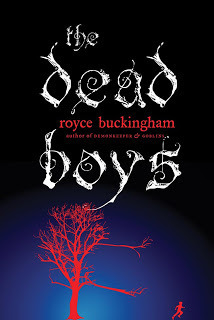
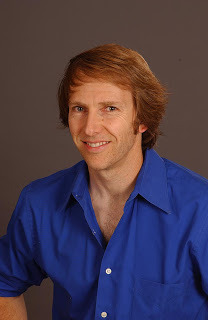
Sasquatch Book Award Nominee
Titles are selected by Librarians in the State of Washington in order to encourage students to read some of the best new books published each year.
http://www.wlma.org/sasquatch
The Sunshine State Young Readers Award (SSYRA) is a program co-sponsored by the Office of Library Media and the Florida Association for Media in Education (FAME). This program for students in grades 3-8 is designed to entice students to read high interest, contemporary literature for personal enjoyment.
http://www.fldoe.org/bii/Library_Media/ssyrap.asp

Published on May 09, 2013 00:00
May 8, 2013
AEI Client Dennis Palumbo's Night Terrors Reviews on Kirkus

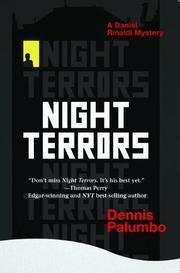
NIGHT TERRORS
by
Dennis Palumbo
Buy now from
AMAZON.COM
BARNES & NOBLE
LOCAL BOOKSELLER

KIRKUS REVIEW
Pittsburgh clinical psychologist Daniel Rinaldi (Fever Dream, 2011, etc.) finds to his sorrow that even serial killers have fans.
Now that Wesley Currim has confessed to killing wealthy Wheeling
coal-mine executive Edward Meachem and led Chief Avery Block and
Detective Sgt. Harve Randall to the headless corpse, you’d think the
case would be closed. But Wes’ mother, Maggie, swears he’s innocent and
provides him with a cast-iron alibi he’s determined to repudiate. Do
Block and Randall have the right man in custody? Dr. Rinaldi, who went
along with them since Wes had refused to talk unless he was called in,
can’t say. And he has no time to yield to Maggie’s pleas and break Wes’
confession because he’s been snatched off the street by FBI agent Neal
Alcott and plunged into a different nightmare. Even though John Jessup,
convicted of killing four prostitutes, has been beaten to death during a
riot in an Ohio prison, the pen pal calling himself “Your Biggest Fan”
is determined to avenge him by carrying on in his tradition. In short
order, the prison guard who killed Jessup, the judge who sentenced him
to four life sentences and the Cleveland ADA who prosecuted him are
shot. Not surprisingly, Lyle Barnes, the retired FBI profiler who helped
nail Jessup, is having night terrors, and Alcott wants Rinaldi to meet
with him and calm him down. For his part, Rinaldi wants to be left alone
to consummate his stymied romance with Detective Eleanor Lowrey of the
Pittsburgh PD. How likely is that when the entire tri-state region is
full of serial killers and killers-in-training?
Some thrillers are beach reads. Palumbo’s are strictly for late at
night and for readers who have no pressing engagements early the next
day.

Published on May 08, 2013 00:00
May 7, 2013
Story Merchant Client Terry Stanfill Signs Her Novel Realms of Gold in Exeter Chapel
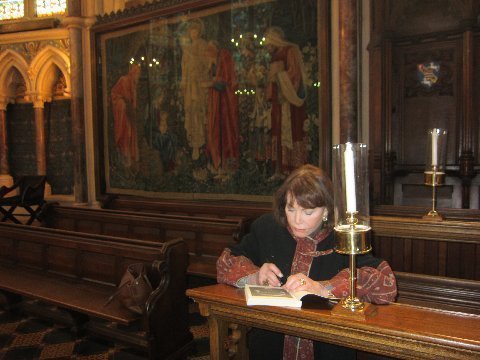
The Chapel, Exeter College,
Oxford--tapestry is by Burne-Jones-William Morris , both had been
students at Exeter College

Published on May 07, 2013 00:00
May 6, 2013
Crown Publishing will be releasing the biography of Robert Ripley titled “A Curious Man!, authored by Neal Thompson May 7th
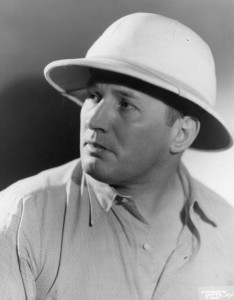
“A Curious Man is the rollicking, terrific story of one of America’s greatest men…Ripley brought back to an awed nation the richness of an endlessly exotic world, and Neal Thompson tells the story with a perfectly-pitched sense of what makes such a man, and a nation, tick.” –Peter Heller, New York Times bestselling author of The Dog Stars
“Anyone who wants to understand America needs to read this book… Neal Thompson gives us a vivid portrait of this complex, restless man in all his maniacally conflicted glory.” –Ben Fountain, National Book Award Finalist and National Book Critics Circle Award winning author of Billy Lynn’s Long Halftime Walk





A shy, insecure, bucktoothed boy, Robert Ripley willed himself to become a man of the world: a talented artist, an athlete, a rabid traveler, an unlikely ladies’ man, a heavy drinker, a playboy-millionaire, a shrewd businessman, entertainer, and media pioneer. He was Howard Hughes crossed with PT Barnum; Peter Pan crossed with Marco Polo. A goofy everyman, a bit of a yokel, his obsessive curiosity about the world and it’s oddities earned fame and fortune. Yet, as his housekeeper once said, the greatest “Believe It or Not” of all was Ripley himself.
More advance Praise for ‘A Curious Man” [PDF]
Raised poor in northern California, LeRoy, as he was known, survived the 1906 earthquake a year after losing his father. Forced to quit high school and to find a job, he started his newspaper career as a sports cartoonist in San Francisco. After moving to New York in 1912, he toiled in relative obscurity until his ‘Believe It or Not’ cartoons, created in 1919, became increasingly popular through the 1920s.
His first book of cartoons and essays, published in 1929, became an instant best-seller and led to his hiring by William Randolph Hearst, who paid him $100,000 a year. By the mid-1930s, he had become one of the highest-paid entertainers of his day, earning $500,000 a year from his cartoons, best-selling books, lectures, films, radio shows, endorsements, and museums. He received more mail than any single person in history (millions of letters a year), and in 1936 was voted the most popular man in America.
By the start of WWII, he had become one of the most eloquently traveled men alive, visiting obscure corners of more than 200 countries. He crossed the Atlantic and Pacific oceans dozens of times and belonged to the Circumnavigators’ Club and the Explorers’ Club. He collected oddities from around the world–as well as beautiful women–at his eccentric mansion on a private island off Mamaroneck, New York (where he moved after living for fifteen years at the New York Athletic Club in midtown Manhattan).
He died after suffering a heart attack in 1949 while filming the 13th episode of his TV show, which featured a story about the creation of the funeral song, Taps.
Believe it!
Charles M. Schulz’s first-ever published cartoon appeared in Ripley’s ‘Believe It or Not’
As a radio pioneer, Ripley broadcast shows from the Grand Canyon, from underwater, from overseas, from inside caves and from the decks of ships.
A talented athlete, he once tried out for the New York Giants and in 1926 became New York City’s handball champion.
Ripley’s popularity foreshadowed such pop-culture phenomena as YouTube, reality TV, Fear Factor, Jerry Springer, Oprah, America’s Funniest Home Videos, and Jackass
From the Epilogue:
The revelations that made Ripley gasp – burning ghats in India, shrunken heads in Ecuador, armless/legless girl wonders – seem tame compared to the extremes of shows like Jackass and the exploits of the masses on YouTube.
And yet, the phrase Ripley coined remains part of the English lexicon nearly a century later. In 2010, “believe it or not” appeared 138 times in The New York Times, and a Google search landed more than 5 million “believe it or not” hits. His spirit lives on in shows like MythBusters and River Monsters. Also thriving are the aspirations Ripley embodied – to show people something they didn’t know, to entertain and educate and titillate, to question and challenge the truth – as are the driving passions of voyeurism, exhibitionism, and the base appreciation of freakishness, oddities, and pranks of nature.
The man who considered himself a rube and a farm boy, who indulged in a lifestyle as risky as any character in his cartoons, who taught readers to gape with respect at the weirdness of man and nature, who contributed to the adoption of America’s national anthem and the creation of the memorial at Pearl Harbor and so much more… he may have been the most unbelievable oddity of all.
~~ Read a brief EXCERPT [PDF]. For the password, visit neal’s new Facebook page. ~~
“Neal Thompson constructs an elegant argument: the world Ripley created is the world in which we now live.” –David Shields, New York Times bestselling author of The Thing About Life Is that One Day You’ll Be Dead

Published on May 06, 2013 12:26
21 Novels to Read by the Time You're 21
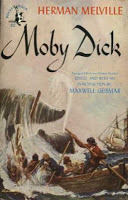
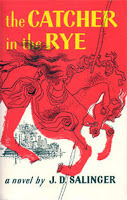
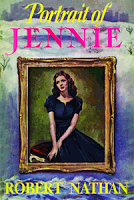
I made this reading list for my granddaughter Meggie, and wanted to share it with you too, though I could easily add at least another ten to this list. It's hard for me to imagine someone not having read these books before she or he reaches 21 (in no particular order):
1) Portrait of Jenny (Robert Nathan)
2) Catcher in the Rye (J. D. Salinger)
3) Moby Dick (Herman Melville)
4) The Heart Is a Lonely Hunter (Carson McCullers)
5) To Kill a Mockingbird (Harper Lee)
6) Little Women (Louisa May Alcott)
7) Dune (Frank Herbert)
8) The Godfather (Mario Puzo)
9) The Black Stallion (Walter Farley)
10) Fahrenheit 451 (Ray Bradbury)
11) Catch 22 (Walter Heller)
12) Slaughterhouse-Five (Kurt Vonnegut)
13) The Collector (John Fowles)
14) Enders Game (Orson Scott Card)
15) Casino Royale (Ian Fleming) -- and all the James Bond books!
16) Love Story (Erich Segal)
17) The Prince and the Pauper (Mark Twain)
18) The Great Gatsby (F. Scott Fitzgerald)
19) Rebecca (Daphne Du Maurier)
20) The Scarlet Letter (Nathaniel Hawthorne)
21) Birdy (William Wharton)
Lagniappe: Siddhartha (Hermann Hesse)

Published on May 06, 2013 00:00
May 4, 2013
Story Merchant Books - April Best Sellers!
Published on May 04, 2013 00:00
Tome Tender Reviews Terry Stanfill's Realms of Gold
Realms of Gold by Terry Stanfill
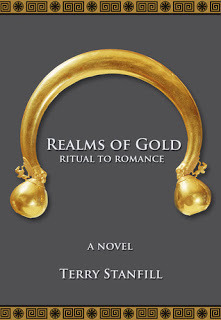
Realms of Gold
by Terry Stanfill
My rating: 4 of 5 stars
Terry Stanfill’s Realms of Gold is part suspense, part mystery, and part romance all in one book, so pay attention to the details, and trust me, realms of Gold is full of rich detail! Giovanni Di Serlo and Bianca Caldwell meet at a wedding in Italy, discovering how much they have in common. He is an Italian archeologist working on a secret dig in Puglia, Italy while she writes articles for an art magazine, getting her inspiration from dreams and visions-a gift passed down through the generations. Bianca is immediately smitten with Giovanni, who is reluctant to share more than a polite cup of coffee with this plain woman. Their common ground is the beauty of history and its many mysteries waiting to be uncovered. When Bianca’s dreams and visions of a woman named Zatoria cause her to contact Giovanni after they have each returned to their own lives, they begin a journey together that leads them on a path that connects the Vix Krater, an ancient bronze vessel to the legend of King Arthur and the Holy Grail. As these two become more involved in ancient history, they begin a romantic journey of their own that binds their hearts as well as their minds.
Terry Stanfill takes us into the hearts and minds of these two people as they travel Europe on a quest through time unlocking the doors of history in this character driven novel. Her writing is dreamlike, with rich scenes, and intense emotional tension. The pace is relaxed and slowly pulls us through on soft waves of well-written prose. As history unfolds, it is plain to see that Terry Stanfill has done her homework in creating this well-crafted tale, making it an intriguing historical read and an unconventional romance with a taste of mystery and quiet adventure.

Realms of Gold
by Terry Stanfill
My rating: 4 of 5 stars
Terry Stanfill’s Realms of Gold is part suspense, part mystery, and part romance all in one book, so pay attention to the details, and trust me, realms of Gold is full of rich detail! Giovanni Di Serlo and Bianca Caldwell meet at a wedding in Italy, discovering how much they have in common. He is an Italian archeologist working on a secret dig in Puglia, Italy while she writes articles for an art magazine, getting her inspiration from dreams and visions-a gift passed down through the generations. Bianca is immediately smitten with Giovanni, who is reluctant to share more than a polite cup of coffee with this plain woman. Their common ground is the beauty of history and its many mysteries waiting to be uncovered. When Bianca’s dreams and visions of a woman named Zatoria cause her to contact Giovanni after they have each returned to their own lives, they begin a journey together that leads them on a path that connects the Vix Krater, an ancient bronze vessel to the legend of King Arthur and the Holy Grail. As these two become more involved in ancient history, they begin a romantic journey of their own that binds their hearts as well as their minds.
Terry Stanfill takes us into the hearts and minds of these two people as they travel Europe on a quest through time unlocking the doors of history in this character driven novel. Her writing is dreamlike, with rich scenes, and intense emotional tension. The pace is relaxed and slowly pulls us through on soft waves of well-written prose. As history unfolds, it is plain to see that Terry Stanfill has done her homework in creating this well-crafted tale, making it an intriguing historical read and an unconventional romance with a taste of mystery and quiet adventure.

Published on May 04, 2013 00:00
May 3, 2013
AEI Client Dennis Palumbo's Interviews on The Big Thrill Mystery Website
Night Terrors by Dennis Palumbo
By Sandra Parshall
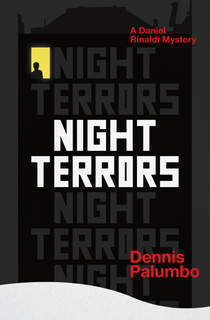
Dennis Palumbo’s love of writing took him to Hollywood, where he enjoyed a successful career as a screenwriter, with credits that include the feature film MY FAVORITE YEAR. He was also a staff writer on the television series WELCOME BACK, KOTTER and wrote episodes and pilots for other series.
Eventually, his interest turned to psychotherapy, and after training he developed a private practice specializing in helping show business clients deal with creative issues. He never stopped writing, though. His first novel, CITY WARS, was published by Bantam, and his short fiction has appeared in ELLERY QUEEN’S MYSTERY MAGAZINE, THE STRAND and elsewhere. He contributes articles and reviews to national publications, and his popular Hollywood on the Couch column for writers and other creative artists appears on the PSYCHOLOGY TODAY website. He is also the author of WRITING FROM THE INSIDE OUT and the mystery short story collection FROM CRIME TO CRIME.
With MIRROR IMAGE (2010), Palumbo began his popular and critically praised thriller series featuring psychologist Daniel Rinaldi and set in the author’s hometown, Pittsburgh. BOOKLIST called the second in the series, FEVER DREAM, “a smart, strong read” and KIRKUS REVIEWS described Rinaldi as “Jack Reacher with a psychology degree.”
In NIGHT TERRORS, Palumbo delivers another compelling tale, as Rinaldi works with two difficult clients who couldn’t be more different: one is a former FBI profiler who is tormented by grisly memories and pursued by a murderer bent on revenge; the other is a loathsome confessed killer whose mother believes he is innocent and wants Rinaldi to prove it. PUBLISHERS WEEKLY calls NIGHT TERRORS “riveting” and KIRKUS REVIEWS notes, “Some thrillers are beach reads. Palumbo’s are strictly for late at night and for readers who have no pressing engagements early the next day.”
In a recent interview, Palumbo talked about NIGHT TERRORS, his protagonist, and his writing life.
First, the inevitable question: Is Daniel Rinaldi a fictional version of Dennis Palumbo? What qualities does he share with you, and how do the two of you differ? Does he have attributes that you envy?
Rinaldi both is and isn’t a fictional version of me. We certainly share biographical data—both Italian-American, born and raised in Pittsburgh, and graduates of the University of Pittsburgh. As therapists, we also share theoretical beliefs and treatment techniques, along with a fair amount of skepticism about much in the psychotherapy field. Particularly when it comes to the pervasive use of diagnostic categories to label people: to try to define, limit or explain away every idiosyncratic or contrary response of individuals. As if anyone has a clue as to what constitutes “normal.”
But there, my similarity with Daniel ends. He’s a former amateur boxer, for one thing.
He’s also a lot more brave and resourceful than I am. Most of the things he encounters would have me running for the hills! So I guess I envy his courage, even though, in the books, his friends and colleagues consider some of his actions merely foolhardy.
When you decided to write a crime fiction series about a therapist, did you consider using Hollywood as your setting? Why did you rule it out and place Rinaldi’s practice in gritty Pittsburgh instead?
I never considered using Hollywood, because—much like the rest of Southern California—it’s been over-used as an arena for crime fiction. On the other hand, I feel that mid-Atlantic states like Pennsylvania, and mid-sized cities like Pittsburgh, haven’t been exploited as much as they could be. Of course, it doesn’t hurt that I love Pittsburgh, and have fond memories of the kind of childhood a kid could have in a tight-knit, ethnically-diverse community like that.
Moreover, there’s the wonderful dichotomy of the “old” Pittsburgh—steel mills, smokestacks, coal barges gliding along the Three Rivers at night—in contrast to the new, gentrified Pittsburgh, with its world-class hospitals and universities, its pioneering role in organ transplants and nanotechnology. As I like to say, it’s a shot-and-a-beer town colliding with the Information Age. Blue collars being exchanged for white ones, with all the unease and uncertainty that implies. It’s a rich, complex, vibrant setting for a contemporary crime series.
I assume you don’t have a lot of serial killers and outright psychopaths as patients in your Hollywood practice. How did you develop and deepen your understanding of such people and the crimes they commit?
Well, the joke answer is, after twenty years as a Hollywood screenwriter, dealing regularly with movie producers and network executives, I already had plenty of experience dealing with psychopaths. Seriously, I guess I’ve done a fair amount of research on the topic. Though I’ve always maintained that every type of character, no matter how heinous or irrational, that a writer can imagine is already inside him or her. Within every writer, I believe, is a nun and a serial killer, a hermit and a vampire, a faithful spouse and a callous infidel. Everything encompassed by the human condition is available to the writer, is something to be acknowledged and explored. A good writer, to borrow a phrase, “contains multitudes.”
In NIGHT TERRORS, you explore a topic that many people probably wonder about: How do criminal profilers, who crawl into the minds of the world’s most repugnant killers, live with the things they’ve seen and heard? How did you learn about the emotional burdens of their work? What do you think sets them apart from other law enforcement personnel?
I’ve read interviews with profilers, and also read memoirs that a few have written.
There’s no question that the work comes with its full share of emotional burden, and burn-out is a significant issue. But curiosity about the human condition, as well as a desire to excavate evil to its very roots, tends to be the overarching motivation for those called to this work. Of course, as is also true about therapists, it would be a mistake to overlook whatever unique, perhaps dysfunctional childhood dynamics fed this desire to explore the darkest corners of the human mind. I won’t presume here to discuss what these dynamics might be, and I’m sure they are as different as each profiler is different from one another. But I feel pretty confident they’re there. As to what sets them apart from other law enforcement personnel, that’s a tough question. The simple answer is: cops and Feds want to catch the bad guy, profilers want to understand them.
You construct complex plots – all those twists and turns that readers love — without sacrificing a satisfying psychological depth. How does a story take shape for you? Do you spend a lot of time on pre-writing planning? Are you ever surprised by unexpected developments or revelations that crop up in the course of writing?
I have to confess—I never plan or outline a novel. I start with characters who seem to come to me, people with significant issues, for whom large things are at stake. Which means I’m not only surprised a lot by unexpected developments and revelations, but I also go down blind alleys and make wrong turns. But I don’t mind this. I like the discovery inherent in that kind of writing.
The truth is, I rarely know who the victim is when I start a new novel, and never know the identity of the killer or killers until far into the book. Then I have to go back and plant the appropriate seeds, red herrings, and misleading conversations. So there’s a lot of groping when I write, if you know what I mean. But I suppose I’m used to it. I also like something the novelist E.L. Doctorow once said about writing a book. He said it was like driving down a dark, twisting road at night. Your headlights only show you ten feet ahead at a time, but sooner or later you get home.
Readers have grown used to seeing corrupt cops and psychopathic psychiatrists in novels, movies, and TV dramas. Do you think writers are playing on the reader’s natural fear of being betrayed by someone they trust? Or do these characters reflect a genuinely negative public opinion of police officers and therapists?
I think both notions have some truth in them. We’re certainly a more cynical culture now, with pretty low expectations of our authority figures. Especially of the male persuasion. The days of unquestioned patriarchal authority are over. We don’t much trust male politicians, doctors, shrinks, and—let’s face it— priests. But as women assume greater positions of authority, they’re also being routinely looked at with suspicion. Take bankers and hedge fund managers, for example. Whether male or female, we don’t trust them. So, for a writer, detailing how people in positions of power betray the trust of those around them is a sure-fire way to engage the reader’s interest and understanding.
One interesting side note: When it comes to the police, as well as firefighters and other first responders, I believe there’s been a renewed respect and appreciation for their efforts. Certainly with regards traumatic events like terrorist attacks and mass killings.
Unlike almost every other governmental or civil authority, we’re glad they’re there.
Your novels are complex, atmospheric and richly descriptive – very different from screenplays. But do you use some screenwriting techniques in your book-length fiction? Can you give an example of how screenwriting has influenced your books?
First of all, thanks for the kind words about my work. As to using techniques I learned as a Hollywood screenwriter, the two aspects of that form that come to mind are a respect for pacing, and a love of good, realistic dialogue. I hear from readers all the time that one of the things they like about my books is the verbal jousting that often occurs between my characters, and particularly the use of humor. I owe much of that skill, such as it is, to my years in television and film.
How do you manage a full-time practice, personal appearances, and a prodigious writing output of both fiction and nonfiction? What is your schedule like? If you had to give up one thing for the sake of your personal life, what would you sacrifice?
Who says I manage it all? Ten minutes after I wake up in the morning, I already feel like I’m three hours behind. To be candid, my life is a real balancing act, one that I don’t always handle with aplomb. But I like being busy, even a tad over-committed.
In terms of schedule, I have a full-time private therapy practice, seeing patients every day from 8 AM till 6 PM. But I also write every day, usually at lunch, and, very occasionally, in the evenings and on weekends. Which is why, unlike most other series novelists who churn out a book (or two!) a year, each new Daniel Rinaldi book takes at least a couple years. Somehow, I also manage to sneak in the occasional blog for THE HUFFINGTON POST and the PSYCHOLOGY TODAY website.
And while I do book signings and whatever media I can get when I have a new book coming out, I only attend a few writing conferences a year. I’d like to attend more, but my life doesn’t make much room for them. My personal life includes a wife, a teenage son, a neurotic though loving Doberman, three cats, and an addiction to watching depressing
documentaries on PBS.
Finally, as to what I’d give up for the sake of my personal life, I’d probably just try to cut back a bit on everything. I love being a therapist, so I guess I’d see fewer patients. I love writing, so I guess I’d just do less of it. I suppose I’d also be willing to skip a depressing documentary or two, but only as a last-ditch measure
What writing projects do you have in the works now?
At the moment, in addition to providing some blogs for mystery sites and doing Q&A sessions like this one—all in support of NIGHT TERRORS—I’m also noodling ideas for the fourth Rinaldi book. As I mentioned, I don’t start until I get a sense of some of the characters, and how they might intersect with Rinaldi’s world.
Plus I always like to explore certain issues in the psychology field. Schizophrenia, suicide, sleep disorders, the current state of mental health treatment. These issues, and what I think about them, provide the background for whatever story I want to tell. Who kills who, and why, all comes later.
By Sandra Parshall

Dennis Palumbo’s love of writing took him to Hollywood, where he enjoyed a successful career as a screenwriter, with credits that include the feature film MY FAVORITE YEAR. He was also a staff writer on the television series WELCOME BACK, KOTTER and wrote episodes and pilots for other series.
Eventually, his interest turned to psychotherapy, and after training he developed a private practice specializing in helping show business clients deal with creative issues. He never stopped writing, though. His first novel, CITY WARS, was published by Bantam, and his short fiction has appeared in ELLERY QUEEN’S MYSTERY MAGAZINE, THE STRAND and elsewhere. He contributes articles and reviews to national publications, and his popular Hollywood on the Couch column for writers and other creative artists appears on the PSYCHOLOGY TODAY website. He is also the author of WRITING FROM THE INSIDE OUT and the mystery short story collection FROM CRIME TO CRIME.
With MIRROR IMAGE (2010), Palumbo began his popular and critically praised thriller series featuring psychologist Daniel Rinaldi and set in the author’s hometown, Pittsburgh. BOOKLIST called the second in the series, FEVER DREAM, “a smart, strong read” and KIRKUS REVIEWS described Rinaldi as “Jack Reacher with a psychology degree.”
In NIGHT TERRORS, Palumbo delivers another compelling tale, as Rinaldi works with two difficult clients who couldn’t be more different: one is a former FBI profiler who is tormented by grisly memories and pursued by a murderer bent on revenge; the other is a loathsome confessed killer whose mother believes he is innocent and wants Rinaldi to prove it. PUBLISHERS WEEKLY calls NIGHT TERRORS “riveting” and KIRKUS REVIEWS notes, “Some thrillers are beach reads. Palumbo’s are strictly for late at night and for readers who have no pressing engagements early the next day.”
In a recent interview, Palumbo talked about NIGHT TERRORS, his protagonist, and his writing life.
First, the inevitable question: Is Daniel Rinaldi a fictional version of Dennis Palumbo? What qualities does he share with you, and how do the two of you differ? Does he have attributes that you envy?
Rinaldi both is and isn’t a fictional version of me. We certainly share biographical data—both Italian-American, born and raised in Pittsburgh, and graduates of the University of Pittsburgh. As therapists, we also share theoretical beliefs and treatment techniques, along with a fair amount of skepticism about much in the psychotherapy field. Particularly when it comes to the pervasive use of diagnostic categories to label people: to try to define, limit or explain away every idiosyncratic or contrary response of individuals. As if anyone has a clue as to what constitutes “normal.”
But there, my similarity with Daniel ends. He’s a former amateur boxer, for one thing.
He’s also a lot more brave and resourceful than I am. Most of the things he encounters would have me running for the hills! So I guess I envy his courage, even though, in the books, his friends and colleagues consider some of his actions merely foolhardy.
When you decided to write a crime fiction series about a therapist, did you consider using Hollywood as your setting? Why did you rule it out and place Rinaldi’s practice in gritty Pittsburgh instead?
I never considered using Hollywood, because—much like the rest of Southern California—it’s been over-used as an arena for crime fiction. On the other hand, I feel that mid-Atlantic states like Pennsylvania, and mid-sized cities like Pittsburgh, haven’t been exploited as much as they could be. Of course, it doesn’t hurt that I love Pittsburgh, and have fond memories of the kind of childhood a kid could have in a tight-knit, ethnically-diverse community like that.
Moreover, there’s the wonderful dichotomy of the “old” Pittsburgh—steel mills, smokestacks, coal barges gliding along the Three Rivers at night—in contrast to the new, gentrified Pittsburgh, with its world-class hospitals and universities, its pioneering role in organ transplants and nanotechnology. As I like to say, it’s a shot-and-a-beer town colliding with the Information Age. Blue collars being exchanged for white ones, with all the unease and uncertainty that implies. It’s a rich, complex, vibrant setting for a contemporary crime series.
I assume you don’t have a lot of serial killers and outright psychopaths as patients in your Hollywood practice. How did you develop and deepen your understanding of such people and the crimes they commit?
Well, the joke answer is, after twenty years as a Hollywood screenwriter, dealing regularly with movie producers and network executives, I already had plenty of experience dealing with psychopaths. Seriously, I guess I’ve done a fair amount of research on the topic. Though I’ve always maintained that every type of character, no matter how heinous or irrational, that a writer can imagine is already inside him or her. Within every writer, I believe, is a nun and a serial killer, a hermit and a vampire, a faithful spouse and a callous infidel. Everything encompassed by the human condition is available to the writer, is something to be acknowledged and explored. A good writer, to borrow a phrase, “contains multitudes.”
In NIGHT TERRORS, you explore a topic that many people probably wonder about: How do criminal profilers, who crawl into the minds of the world’s most repugnant killers, live with the things they’ve seen and heard? How did you learn about the emotional burdens of their work? What do you think sets them apart from other law enforcement personnel?
I’ve read interviews with profilers, and also read memoirs that a few have written.
There’s no question that the work comes with its full share of emotional burden, and burn-out is a significant issue. But curiosity about the human condition, as well as a desire to excavate evil to its very roots, tends to be the overarching motivation for those called to this work. Of course, as is also true about therapists, it would be a mistake to overlook whatever unique, perhaps dysfunctional childhood dynamics fed this desire to explore the darkest corners of the human mind. I won’t presume here to discuss what these dynamics might be, and I’m sure they are as different as each profiler is different from one another. But I feel pretty confident they’re there. As to what sets them apart from other law enforcement personnel, that’s a tough question. The simple answer is: cops and Feds want to catch the bad guy, profilers want to understand them.
You construct complex plots – all those twists and turns that readers love — without sacrificing a satisfying psychological depth. How does a story take shape for you? Do you spend a lot of time on pre-writing planning? Are you ever surprised by unexpected developments or revelations that crop up in the course of writing?
I have to confess—I never plan or outline a novel. I start with characters who seem to come to me, people with significant issues, for whom large things are at stake. Which means I’m not only surprised a lot by unexpected developments and revelations, but I also go down blind alleys and make wrong turns. But I don’t mind this. I like the discovery inherent in that kind of writing.
The truth is, I rarely know who the victim is when I start a new novel, and never know the identity of the killer or killers until far into the book. Then I have to go back and plant the appropriate seeds, red herrings, and misleading conversations. So there’s a lot of groping when I write, if you know what I mean. But I suppose I’m used to it. I also like something the novelist E.L. Doctorow once said about writing a book. He said it was like driving down a dark, twisting road at night. Your headlights only show you ten feet ahead at a time, but sooner or later you get home.
Readers have grown used to seeing corrupt cops and psychopathic psychiatrists in novels, movies, and TV dramas. Do you think writers are playing on the reader’s natural fear of being betrayed by someone they trust? Or do these characters reflect a genuinely negative public opinion of police officers and therapists?
I think both notions have some truth in them. We’re certainly a more cynical culture now, with pretty low expectations of our authority figures. Especially of the male persuasion. The days of unquestioned patriarchal authority are over. We don’t much trust male politicians, doctors, shrinks, and—let’s face it— priests. But as women assume greater positions of authority, they’re also being routinely looked at with suspicion. Take bankers and hedge fund managers, for example. Whether male or female, we don’t trust them. So, for a writer, detailing how people in positions of power betray the trust of those around them is a sure-fire way to engage the reader’s interest and understanding.
One interesting side note: When it comes to the police, as well as firefighters and other first responders, I believe there’s been a renewed respect and appreciation for their efforts. Certainly with regards traumatic events like terrorist attacks and mass killings.
Unlike almost every other governmental or civil authority, we’re glad they’re there.
Your novels are complex, atmospheric and richly descriptive – very different from screenplays. But do you use some screenwriting techniques in your book-length fiction? Can you give an example of how screenwriting has influenced your books?
First of all, thanks for the kind words about my work. As to using techniques I learned as a Hollywood screenwriter, the two aspects of that form that come to mind are a respect for pacing, and a love of good, realistic dialogue. I hear from readers all the time that one of the things they like about my books is the verbal jousting that often occurs between my characters, and particularly the use of humor. I owe much of that skill, such as it is, to my years in television and film.
How do you manage a full-time practice, personal appearances, and a prodigious writing output of both fiction and nonfiction? What is your schedule like? If you had to give up one thing for the sake of your personal life, what would you sacrifice?
Who says I manage it all? Ten minutes after I wake up in the morning, I already feel like I’m three hours behind. To be candid, my life is a real balancing act, one that I don’t always handle with aplomb. But I like being busy, even a tad over-committed.
In terms of schedule, I have a full-time private therapy practice, seeing patients every day from 8 AM till 6 PM. But I also write every day, usually at lunch, and, very occasionally, in the evenings and on weekends. Which is why, unlike most other series novelists who churn out a book (or two!) a year, each new Daniel Rinaldi book takes at least a couple years. Somehow, I also manage to sneak in the occasional blog for THE HUFFINGTON POST and the PSYCHOLOGY TODAY website.
And while I do book signings and whatever media I can get when I have a new book coming out, I only attend a few writing conferences a year. I’d like to attend more, but my life doesn’t make much room for them. My personal life includes a wife, a teenage son, a neurotic though loving Doberman, three cats, and an addiction to watching depressing
documentaries on PBS.
Finally, as to what I’d give up for the sake of my personal life, I’d probably just try to cut back a bit on everything. I love being a therapist, so I guess I’d see fewer patients. I love writing, so I guess I’d just do less of it. I suppose I’d also be willing to skip a depressing documentary or two, but only as a last-ditch measure
What writing projects do you have in the works now?
At the moment, in addition to providing some blogs for mystery sites and doing Q&A sessions like this one—all in support of NIGHT TERRORS—I’m also noodling ideas for the fourth Rinaldi book. As I mentioned, I don’t start until I get a sense of some of the characters, and how they might intersect with Rinaldi’s world.
Plus I always like to explore certain issues in the psychology field. Schizophrenia, suicide, sleep disorders, the current state of mental health treatment. These issues, and what I think about them, provide the background for whatever story I want to tell. Who kills who, and why, all comes later.

Published on May 03, 2013 00:00





